Forbidden Druid V2
Wheel Size: 29’’ and MX options
Travel: 130 mm rear / 150 mm front
Geometry highlights:
- Sizes offered: S1, S2, S3, S4
- Headtube angle: 65° (29’’) or 64.5° (MX)
- Seat tube angle: 77°
- Reach: 480 mm (size S3, 29’’)
- Chainstay length: 423 to 466 mm (varies by size)
Frame material: Carbon fiber
Price:
- Frame w/ RockShox Super Deluxe Ultimate shock: $3,799 USD / $4,899 CAD
- Complete bikes: $6,099 to $8,899 USD / $7,899 to $11,499 CAD
Blister’s Measured Weight: 32.21 lb / 14.61 kg (Druid X0 RS U 29’’, S3)
Test Locations: Washington & British Columbia
Reviewer: 6’, 165 lbs / 183 cm, 74.9 kg
Test Duration: 3.5 months
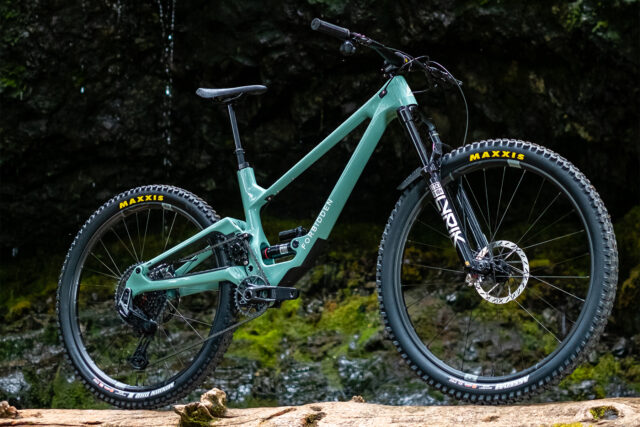
Intro
High-pivot bikes are increasingly common in the gravity arena, but there still aren’t too many high-pivot Trail bikes out there. Forbidden was one of the first companies to offer one with the original Druid back in 2019, and now there’s a new version. It’s still got a high-pivot suspension layout (albeit a pretty different one from the original — more on that in a minute) and there’s a whole lot more that has changed, too. Let’s get into it:
The Frame
As with the original Druid, the Druid V2 is offered in carbon fiber only and gets 130 mm of rear travel (paired with a 150 mm fork) from a high-pivot suspension layout. But Forbidden has given the Druid’s suspension layout a big overhaul, moving it from a linkage-driven single pivot on the original version to what is effectively an upside-down Horst link layout, similar in concept to the layout used on the Norco Range and others.
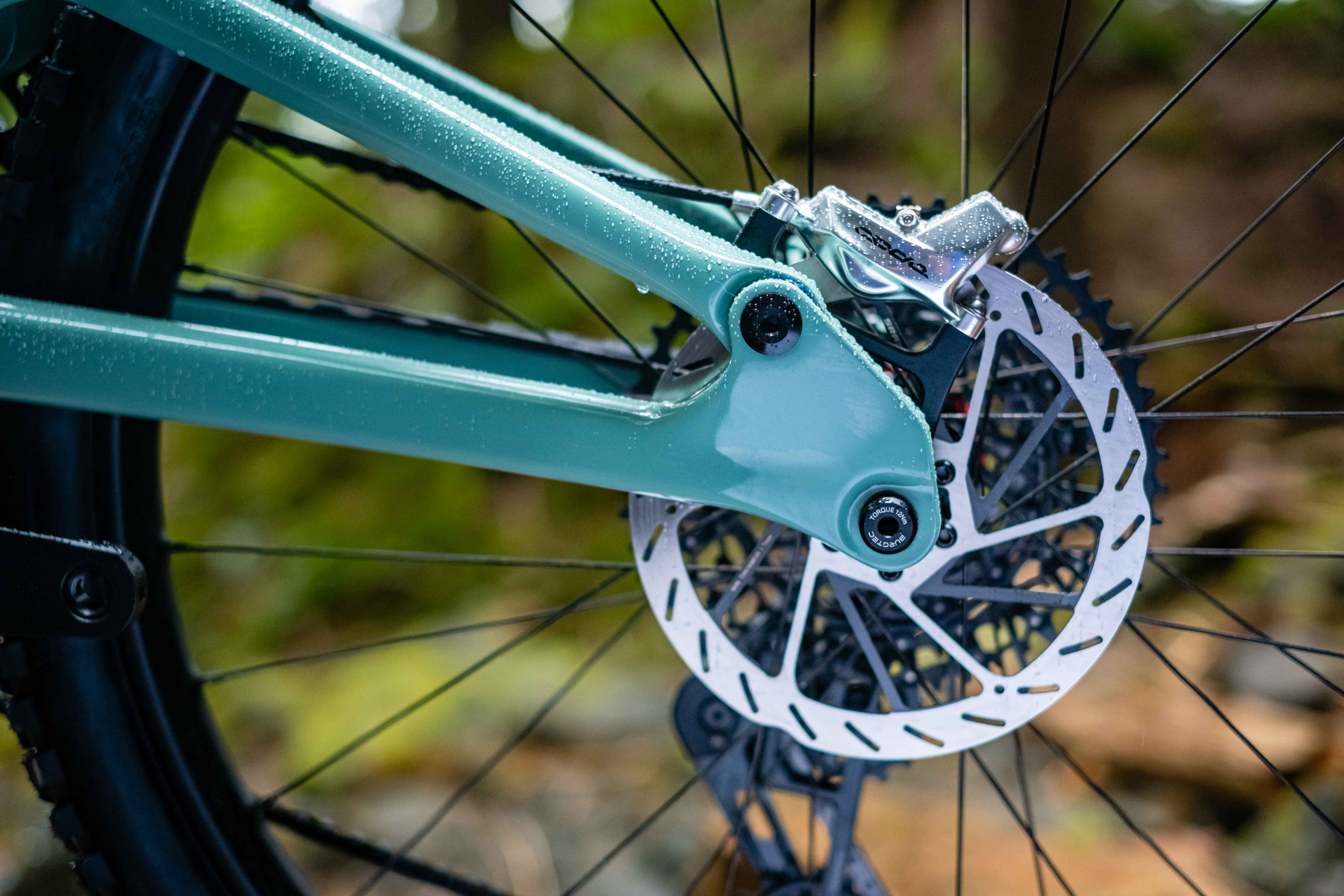
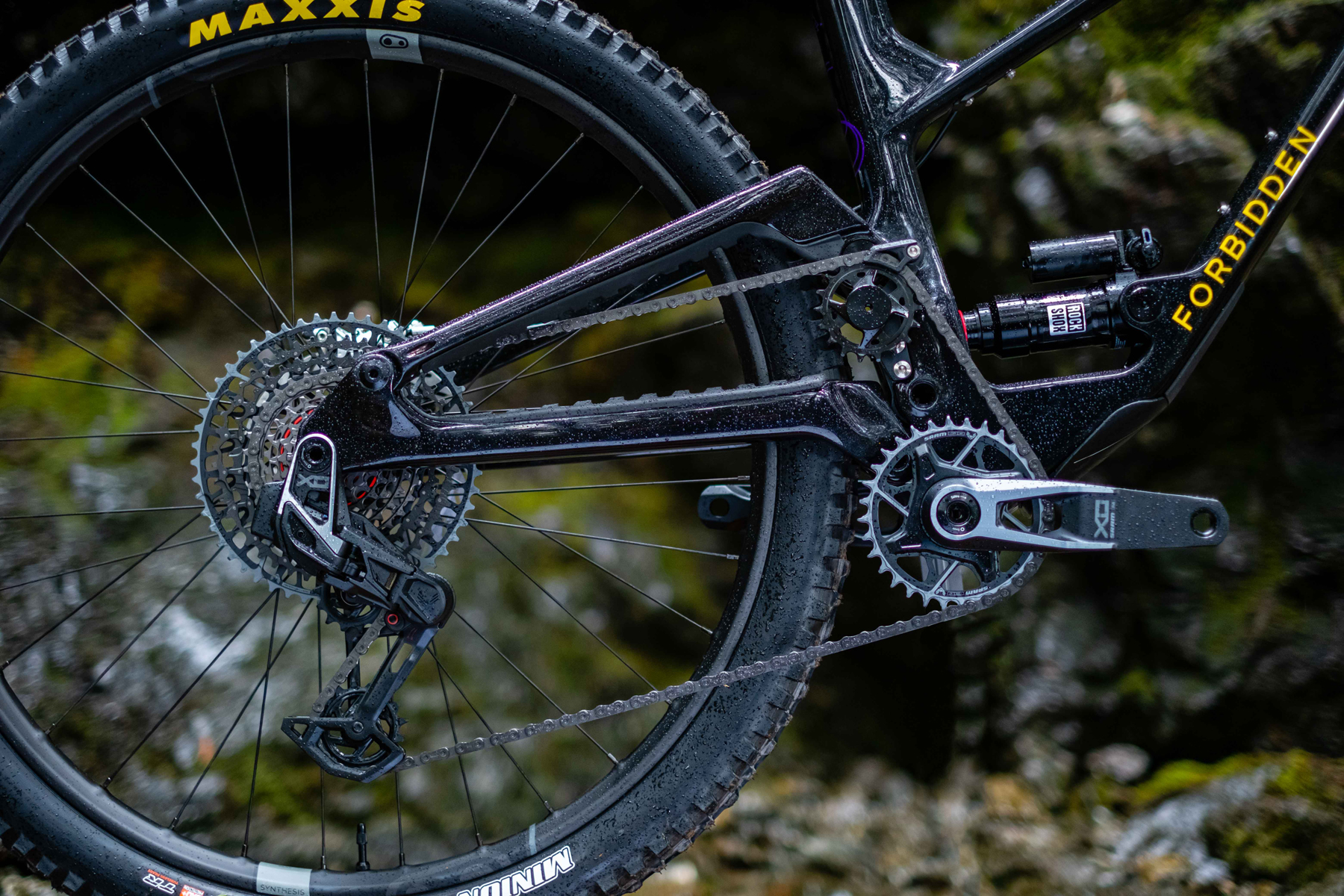
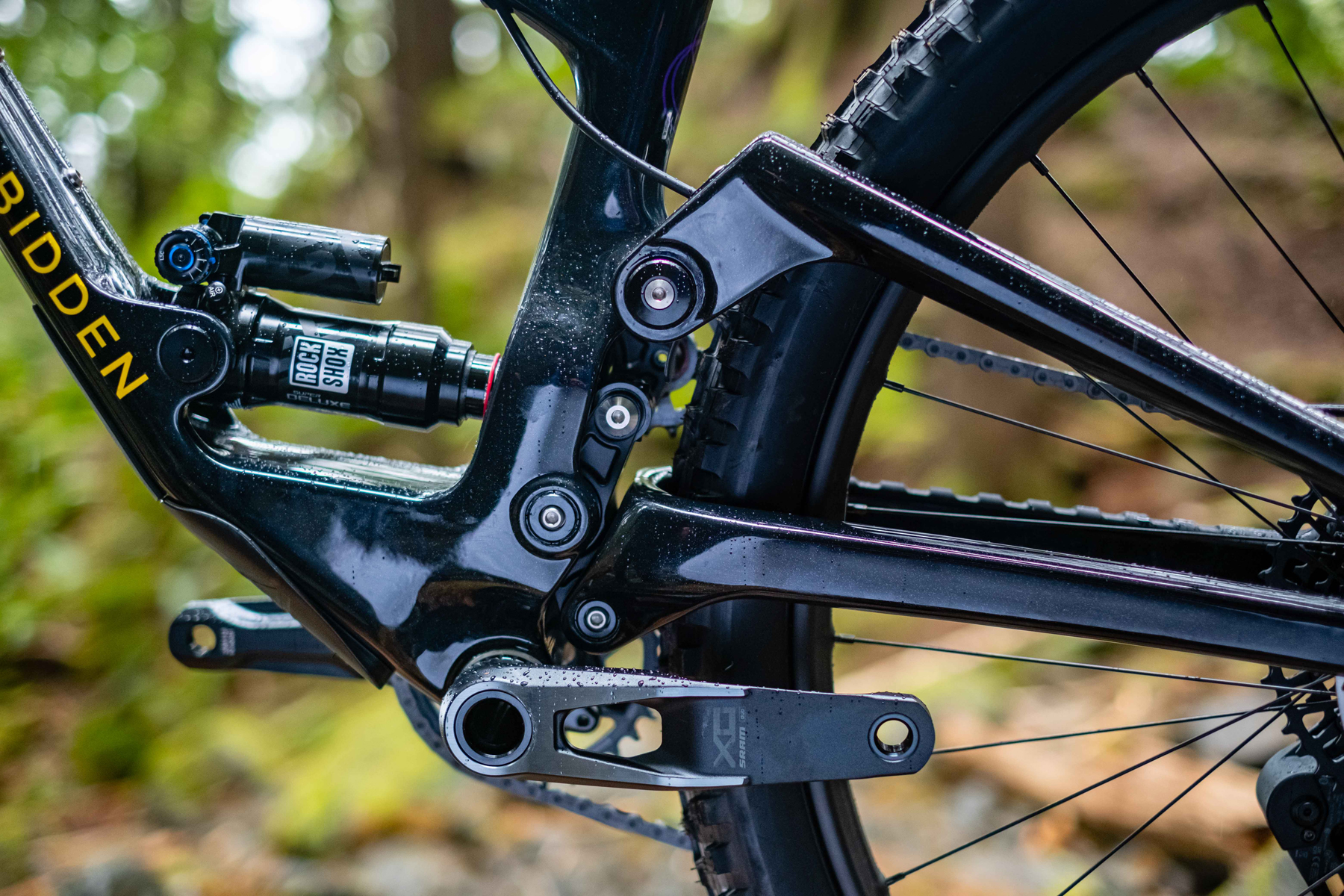
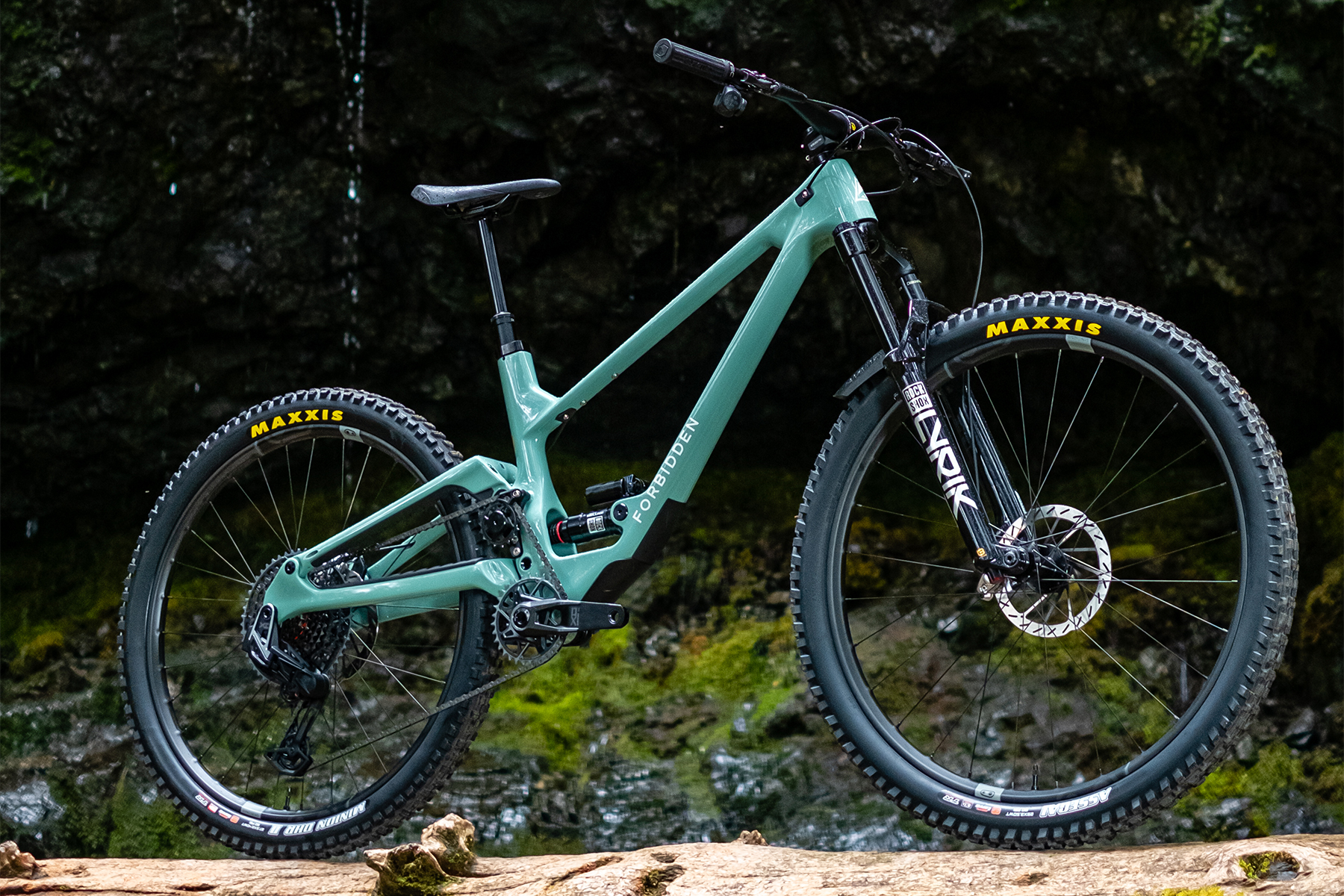
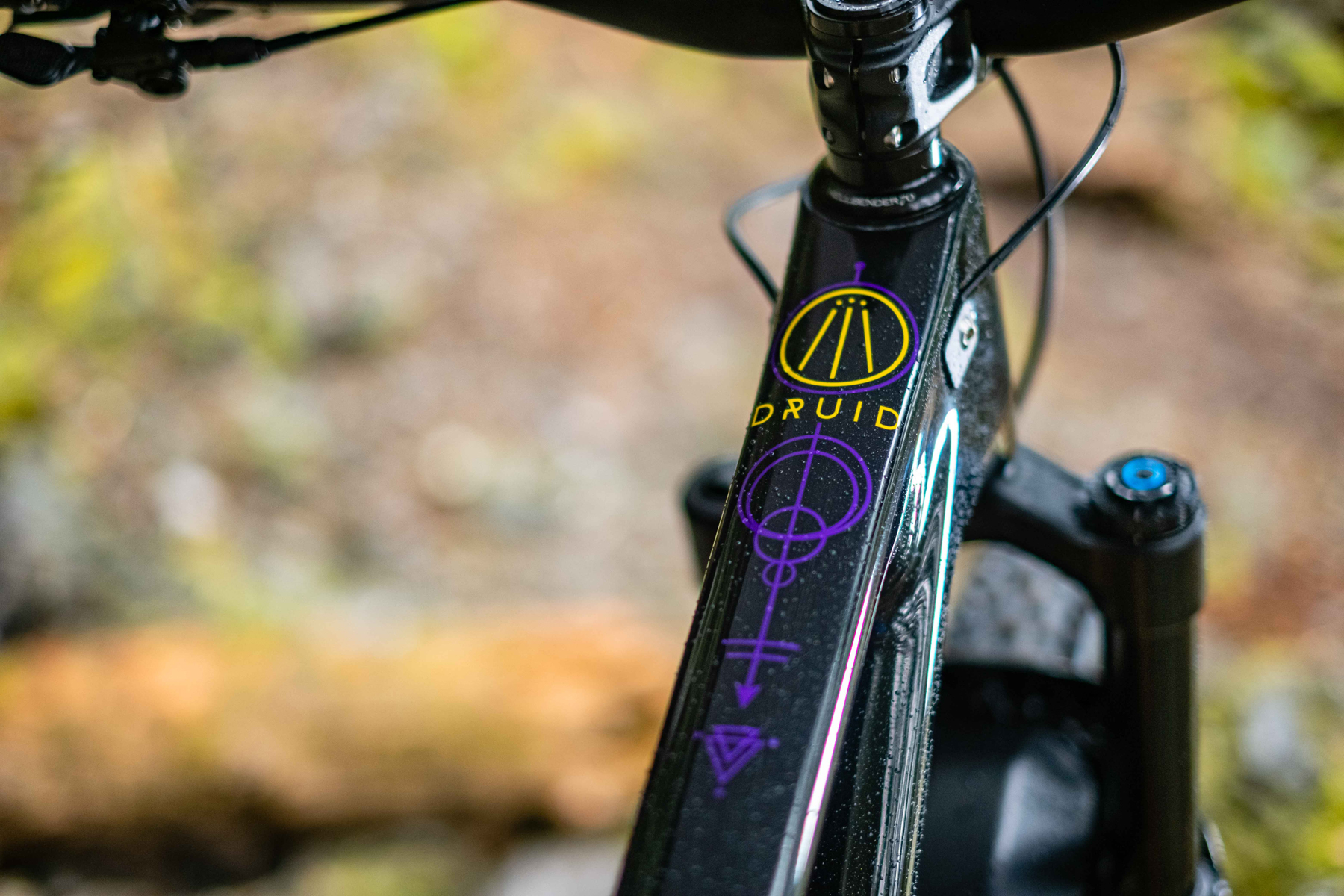
Forbidden actually debuted that configuration — which they’re calling “Trifecta V2” — on their Supernought DH bike, back when it was in the prototype stage. Interestingly, they say that doing away with need for a lower chainguide with a roller was a big part of their rationale for making that change on the Druid. The first-generation Druid (and its bigger sibling, the Dreadnought V1) needed one to achieve sufficient chain wrap around the chainring, due to the placement of the idler pulley. The new layout let Forbidden place the idler farther back on the frame to remediate that issue.
But the change in design also brings about some substantial changes to the suspension kinematics, most notably the anti-rise curve. High-single-pivot bikes tend to have very high levels of anti-rise, which has the effect of making the bike settle deeper into its rear travel under braking, and while the Druid V2’s anti-rise curve starts out pretty high, at just under 130%, it falls off much faster than that of the original Druid.
The leverage curve hasn’t changed nearly as much (the Druid V2 is a little higher leverage overall, but the shape is pretty similar to that of the original), going from about 2.9:1 to 2.3:1 in a mostly straight-ish line. Anti-squat starts off higher, at about 137% but falls off more quickly, and in doing so produces a little less pedal kickback than the original Druid.
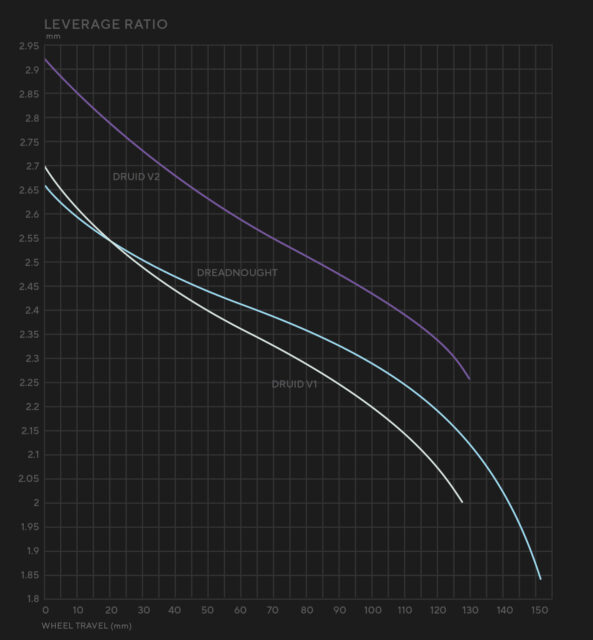
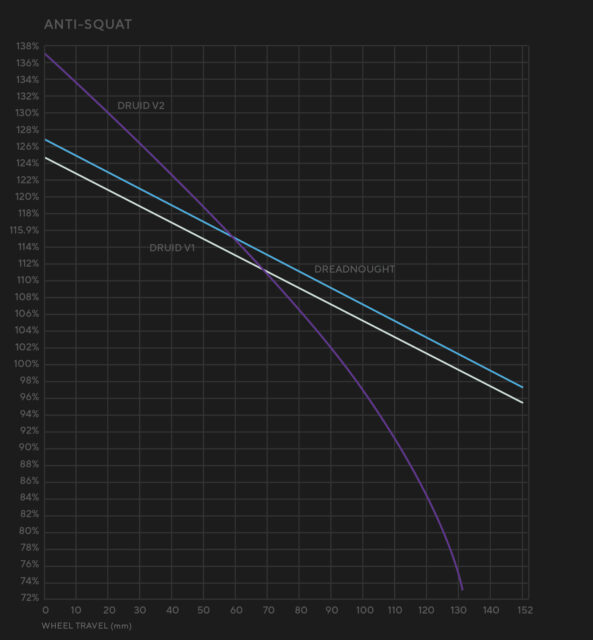
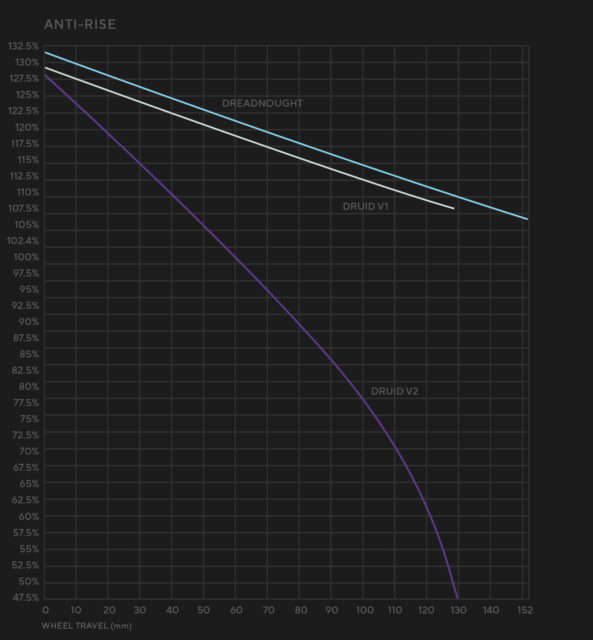
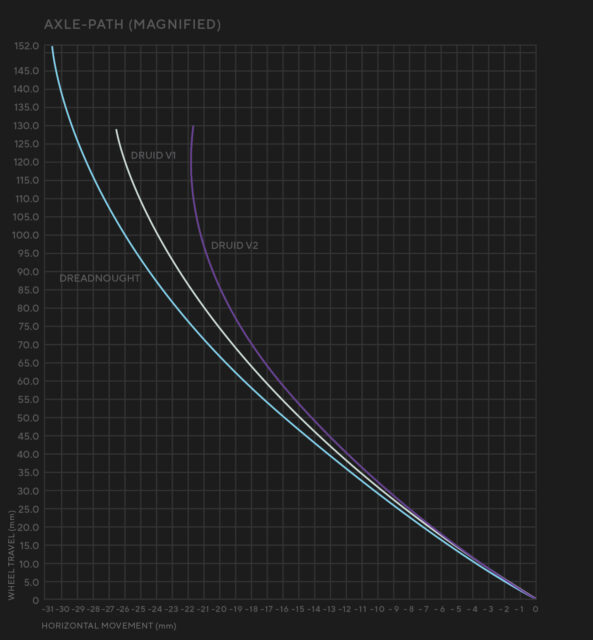
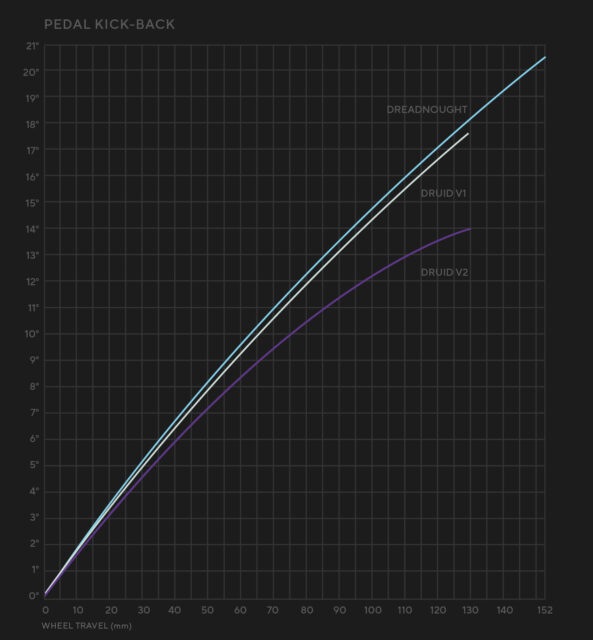
As with the original Druid, the new V2 bike can be run with either dual 29’’ wheels or in a mullet configuration with a 27.5’’ rear wheel. Toggling back and forth requires a chainstay swap, so it’s a little more involved than on some other bikes (and more expensive, at $499 USD), but it’s an option. Complete bikes and frames are available in your choice of rear-wheel configuration.
The Druid V2 also gets updated to an 18-tooth steel idler pulley that Forbidden said is harder wearing than prior iterations, and has gotten a revised tooth profile for compatibility with various 12-speed chains, including the new SRAM T-Type ones. And in keeping with that, the idler mount is modular to allow for 52 or 55 mm chainlines as well. There’s also a SRAM UDH derailleur hanger, of course, fully internal cable routing (with the option to route the brake line on either side of the frame depending on which hand you use for the rear brake), and ample rubber guards on the chainstay, seatstay, and downtube. The lower part of the downtube guard has a removable port, both to help with cable routing and to allow storage inside the downtube, which now features a tool-free closure in place of the bolt-on one from the prior-generation bike. There’s room for a water bottle inside the front triangle on the full size range, plus an extra accessory mount underneath the top tube.
I also need to give Forbidden a shoutout for dropping “just say no to headset cable routing” in their press release for the new Druid — I’d specifically called for a bike company to take that stand in Ep.259 of the Blister Podcast, and then got the Druid launch information in my inbox the day after we recorded that episode.
Fit & Geometry
Forbidden offers the Druid in four sizes, which have been re-labeled to S1, S2, S3, and S4 — roughly correlating to the Small through XL on the original Druid. As compared to the original bike, the reach has grown by 15 mm per size (to 480 mm on the size S3), the headtube slackened by 0.5° to 65°, and the seat tube steepened by 1.5° (to 77°, both effective and actual).
Those numbers are all for the 29’’ configuration; the MX one slackens the head- and seat-tube angles by 0.5°, lops 5 mm off the reach, and lowers the bottom bracket by 6 mm (to a stated 29 mm of drop from the line between the two axles, from 35 mm on the 29er).
That’s all pretty normal for a 130mm-travel Trail bike, but the one number that really stands out on the Druid’s geo chart is the chainstay length. Forbidden is far from alone in varying the chainstay length on their bikes based on frame size, but the degree to which they do so is where things get interesting — the Druid’s chainstays start at an extremely-short 423 mm on the S1 frame and then grow by a massive ~14 mm per size, all the way up to a colossal 466 mm on the S4. I can’t think of a modern bike in this travel range that has shorter stays than the S1 Druid, or one that’s even close to as long as the S4. Forbidden’s argument is that those huge jumps make for a consistent ratio of chainstay length to wheelbase across the size range, but it’s notable that most companies that do size-specific chainstays make much, much smaller changes from size to size — typically on the order of 3 or 4 millimeters.
Forbidden’s math does indeed check out, but is that the right goal to achieve a consistent-feeling ride across frame sizes? Forbidden is blazing its own trail here, but maybe they’re on to something.
The Builds
The Druid is available in three builds, all with SRAM Transmission groupsets, RockShox Lyrik / Super Deluxe suspension (in varying tiers for both). The entry level GX AXS RS S build comes in at $6,099 USD / $7,899 CAD and gets you a GX T-Type group, a Lyrik Select / Super Deluxe R suspension package, and Code Bronze Stealth brakes. The GX AXS RS S Plus upgrades the suspension to — you guessed it — the Select+ versions of the Lyrik and Super Deluxe, along with Code Silver Stealth brakes for $6,899 USD / $8,999 CAD. The top-shelf X0 RS U gets an X0 Transmission group, Ultimate-tier suspension, and Crank Brothers Synthesis carbon wheels in place of the aluminum versions on the GX builds and will run you $8,899 USD / $11,499 CAD. A frame with a RockShox Super Deluxe Ultimate shock retails for $3,799 USD / $4,899 CAD if you want to build a Druid on your own.

- Drivetrain: SRAM GX T-Type
- Brakes: SRAM Code Bronze Stealth (w/ 180 mm rotors)
- Fork: RockShox Lyrik Select
- Shock: RockShox Super Deluxe R
- Wheels: Crank Brothers Synthesis Enduro
- Dropper Post: OneUp
- Drivetrain: SRAM GX T-Type
- Brakes: SRAM Code Silver Stealth (w/ 180 mm rotors)
- Fork: RockShox Lyrik Select+
- Shock: RockShox Super Deluxe Select+
- Wheels: Crank Brothers Synthesis Enduro
- Dropper Post: OneUp
- Drivetrain: SRAM X0 T-Type
- Brakes: SRAM Code Ultimate Stealth (w/ 180 mm rotors)
- Fork: RockShox Lyrik Ultimate
- Shock: RockShox Super Deluxe Ultimate
- Wheels: Crank Brothers Synthesis Enduro Carbon
- Dropper Post: OneUp
FULL REVIEW
We’ve ridden a whole lot of high-pivot bikes over the years, but the vast majority of them have more suspension travel — usually by a lot — than the Forbidden Druid V2. So, has Forbidden managed to make a coherent-feeling Trail bike that makes good use of the layout? I was eager to find out.
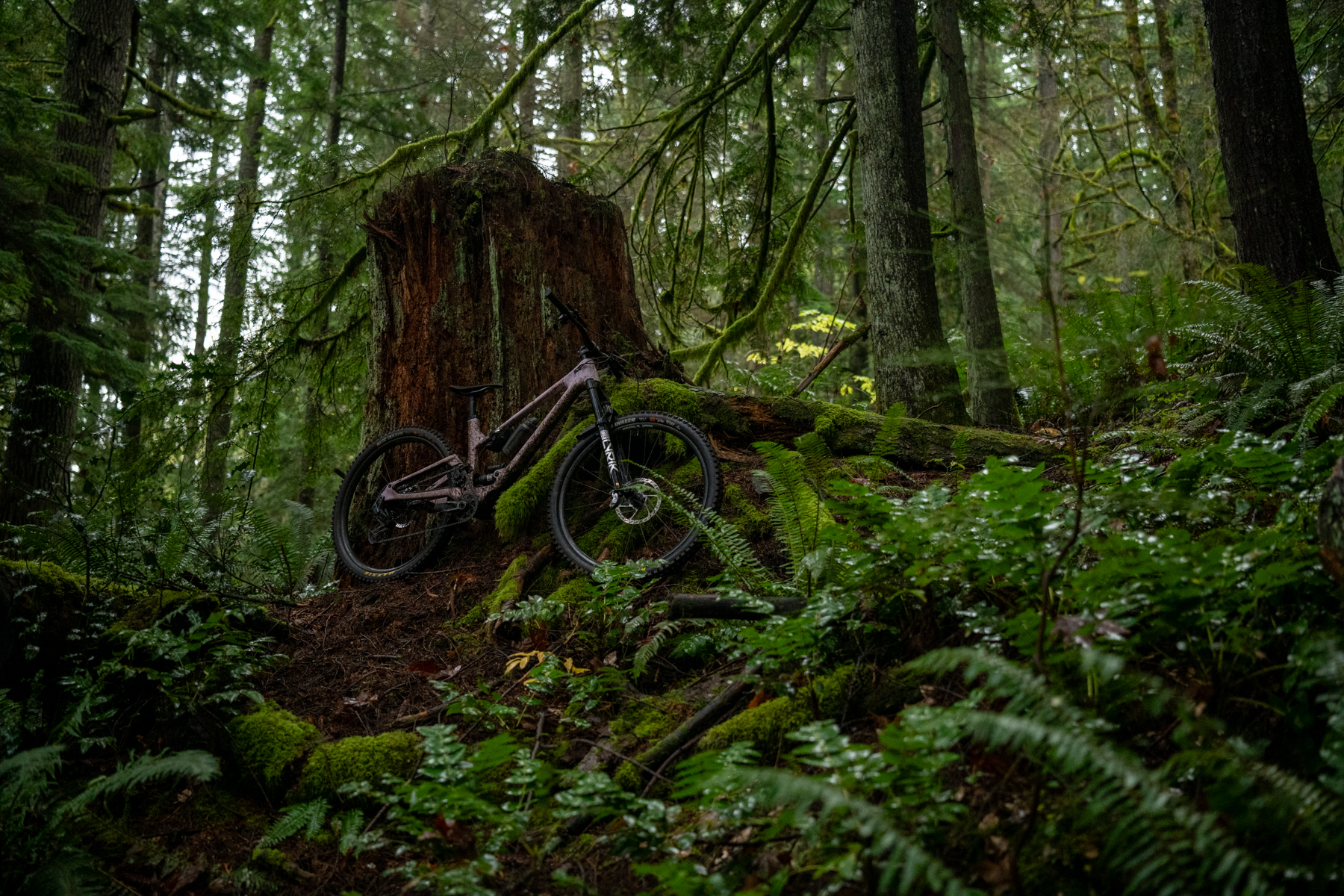
Fit & Sizing
David Golay (6’, 165 lb / 183 cm, 74.9 kg): For reference, Forbidden’s sizing chart puts me squarely in the band for the S3 frame and well outside the range for the S2 or S4. Just looking at the reach and stack numbers, I could imagine myself being happy on either the S3 or S4, but taking a more holistic view, I was pretty sure the S3 would be the better option. Having now ridden it, I’m confident that I was correct.
The biggest factor that steered me to the S3 is the Druid’s chainstay length. I’m generally a fan of relatively long chainstays, and at a static 452 mm length, the S3’s certainly fit the bill (to say nothing of the S4’s 466 mm chainstays, especially once you account for the rearward axle path that the high pivot layout produces).
It’s not that I was worried the chainstays would be too long, exactly. I just figured that the combination of notably long chainstays plus a relatively short front-center would make for a bike that works best when ridden from a notably centered position. In doing so, I figured it would shift my hips and shoulders back, and make the Druid’s fit (mostly while standing up and descending) feel bigger than the reach and stack numbers on their own would suggest. That proved to be exactly right.
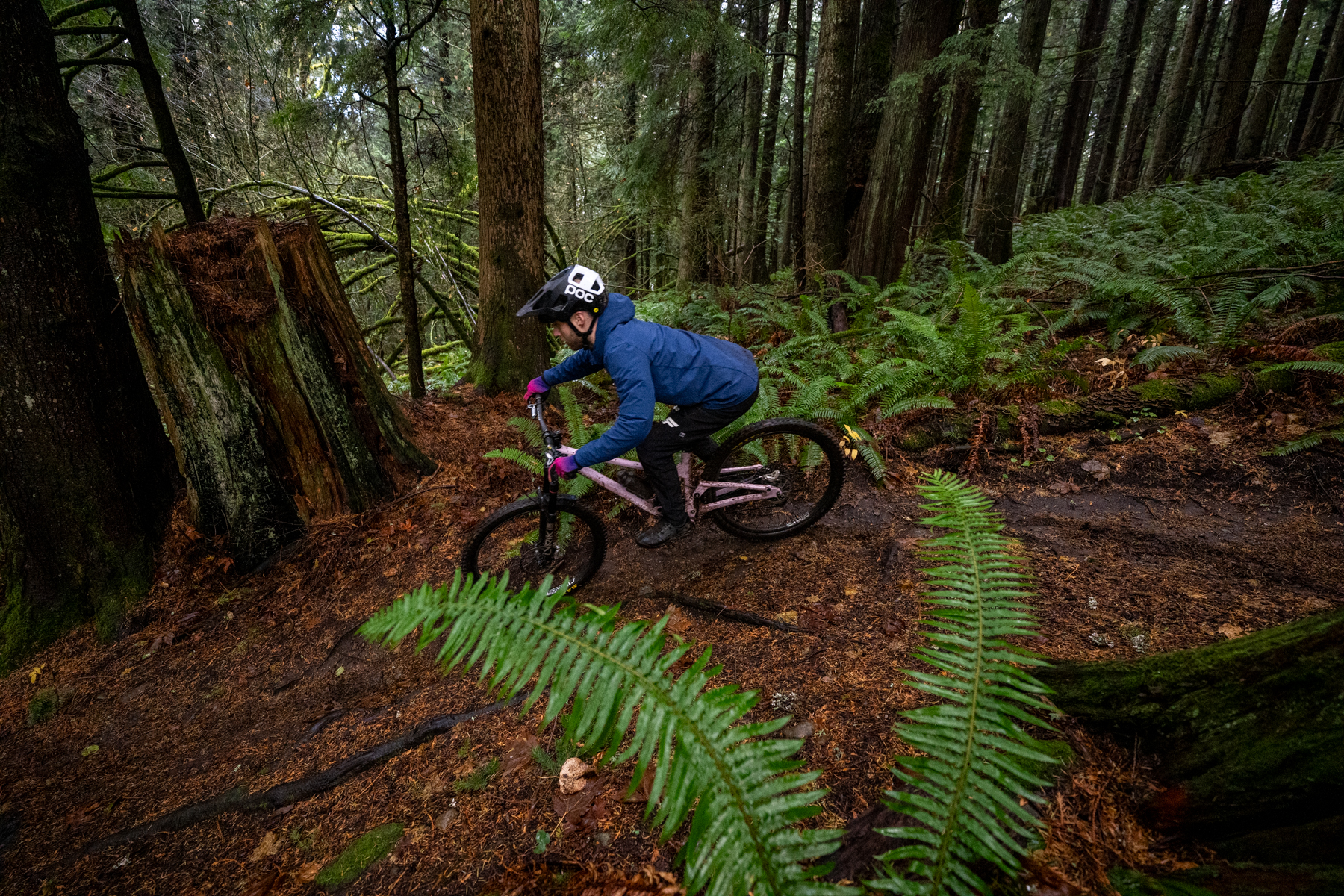
That said, I think it’s worth commenting on how dramatically the Druid’s chainstay length changes across the size range. The S1 frame starts with a notably short 423 mm static length, and the number grows by about 14 mm per frame size. Size-specific chainstay lengths have become commonplace, but those sizing jumps are way bigger than what any other brand that I can think of is doing.
Forbidden’s take is that those big jumps make for a consistent ratio of front- to rear-center across the whole size range, and through it, a more similar ride feel for folks of different heights. The math is unassailable, but it’s harder to assess whether using the bottom bracket as the reference point is really the most optimal way to achieve that goal. It certainly has some relevance, since the bottom bracket position locates the rider’s feet on the bike, but it seems entirely possible that riders of different heights wind up with their center of gravity positioned somewhat differently relative to the bottom bracket. (On average, anyway; the rider’s center of gravity obviously moves around a lot while riding, which complicates things.)
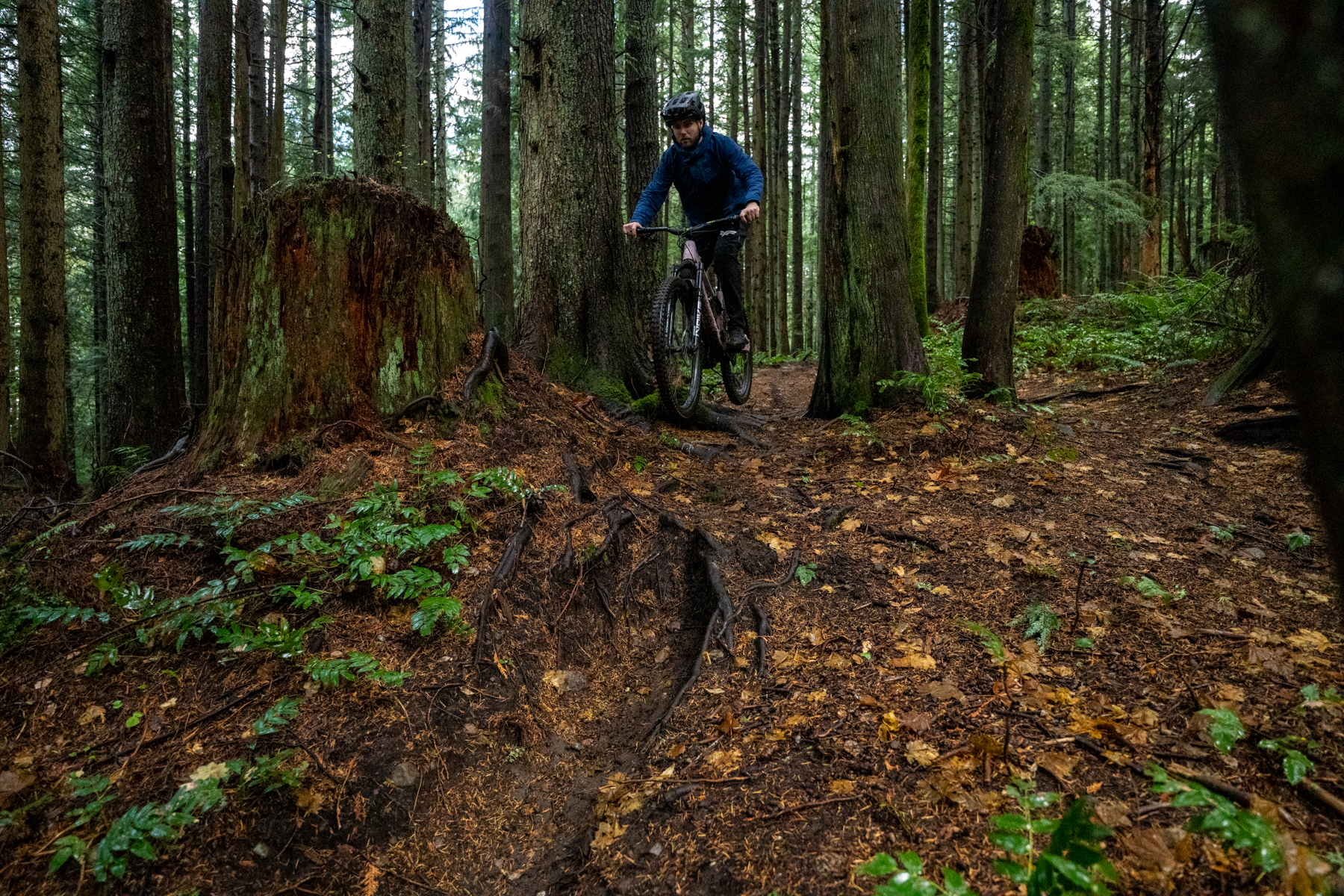
I really can’t say with any certainty to what extent Forbidden is or isn’t right on that point. Putting me on an S1 Druid wouldn’t provide any useful information beyond confirming that I’d look like a circus bear on it. But I think there is a useful point to tease out here.
My thinking is that, regardless of whether Forbidden’s chainstay length variability truly produces a more consistent feel across the size range in some abstract sense, the chainstay lengths on the smaller sizes (the S1 in particular) are likely to be a bit shorter than most folks on that size are used to. Conversely, the chainstays on the bigger sizes (especially the S4) are longer than just about anything else in the Druid’s class. Whether or not that’s a good thing is going to be very subjective, but in any case, it’s worth bearing in mind that they’ll probably feel pretty different from other bikes — particularly given how chainstay length impacts the weight distribution of a bike, and through it, the fit to some extent.
Anyway, the fit of the S3 29’’ Druid worked great for me. I’ll get into the finer points of how it all came together on the trail in a bit, but in short, I got along great with the fit, and at no point was I tempted to try a different frame size. Forbidden’s sizing chart got it right in my case.
Climbing
The Druid is decidedly on the more descending-oriented end of the spectrum as 130mm-travel Trail bikes go, but it still climbs pretty well, too. As I preferred to set it up, the Druid’s rear suspension doesn’t feel super plush and cushy in low-speed climbing situations, but it’s active enough to provide very good traction under power. The Druid’s pedaling efficiency from a suspension-movement standpoint is also solid, and I rarely found the need to use the RockShox Super Deluxe’s climb switch (which is a plus, because the shock’s low-slung position in the frame makes reaching the climb switch on the go tricky).
I like the Druid’s pedaling position quite a bit, too. As shorter-travel Trail bikes go, its 77° effective seat tube angle (the S3 frame’s actual angle is also 77°) is on the steeper side but isn’t so far off the deep end that the Druid feels awkward on more rolling, varied trails. And given what the Druid can do on the way down (more on that shortly), making a bike that’s a bit more winch-and-plummet-oriented than most others in its travel bracket makes perfect sense.
[Aside on seat tube angles: I also think that Forbidden’s approach to seat angles across sizes is smart, in that they keep the effective seat tube angle consistent across the size range but make the actual angle steeper on bigger sizes. Taller folks with longer legs are going to have higher seat heights, and the effective seat tube angle, as it is typically measured at the top of the head tube, is going to be less reflective of where their seat ends up than it will be for folks whose seat height is closer to that point. Giving the big bikes a steeper actual seat tube stops riders who fit them from ending up way off the back of the bike when climbing, which can be an issue on bikes with not-so-steep actual seat tubes.]
That said, I have one reservation about the Druid’s climbing performance. Most modern high-pivot bikes don’t feel like they add much drag so long as the chain is reasonably clean and properly lubed, but their drivetrain efficiency tends to fall off faster (than bikes with a conventional layout) as the chain gets dirty. That’s true of the Druid as well, but the rate at which drag (and noise) start to creep in is higher than average for high-pivot bikes. I think that’s mostly down to the notably rearward position of the idler pulley.
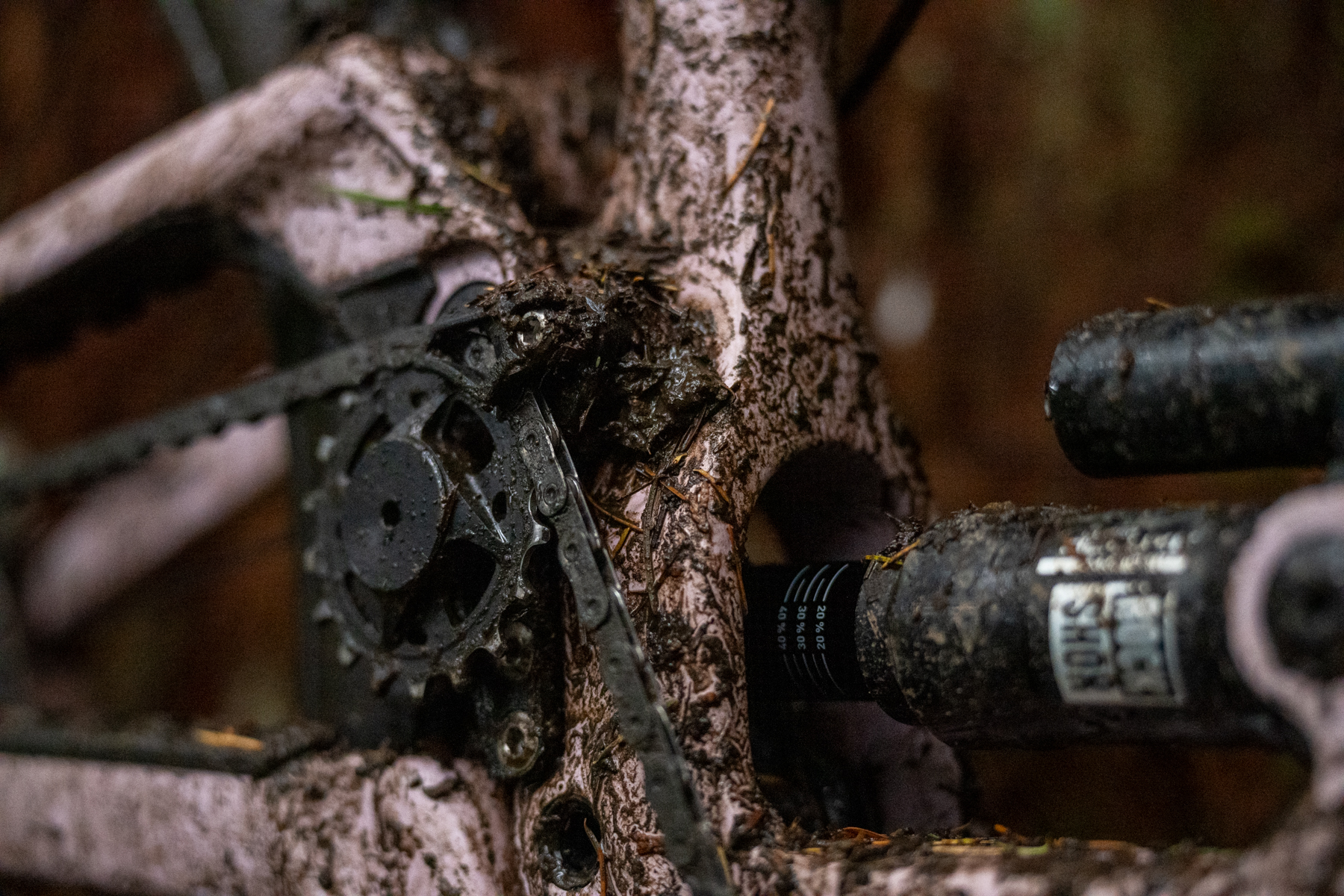
The result of that positioning is that the chain angle in the lower gears is more extreme than it is on a lot of other bikes (high pivot or otherwise). There’s also not a ton of chain wrap around the idler pulley. That latter point is more applicable to the larger frame sizes than the smaller ones, since Forbidden accomplishes their chainstay length variation by essentially moving the bottom bracket’s position on the front triangle, rather than making different size-specific rear triangles.
[I don’t think it’s a coincidence that the Contra MC, with its enormous and very forward idler pulley, is the best high-pivot bike I’ve been on to date when it comes to staving off drivetrain drag as the chain gets dirty. It’s not wholly immune, but it takes longer to become noticeable than most high-pivot bikes.]
How much this aspect is going to matter will probably vary quite a bit from rider to rider. If you’re a maintenance-averse sort who cleans and lubes your chain on a geologic time scale, the Druid is going to get crunchy rather quickly. (Staying more on top of such things would be a great New Year’s resolution, no matter what you’re riding.) In drier conditions, you’ve got more leeway; if you’re regularly doing long rides in wet conditions, you should expect a notable degradation in drivetrain efficiency by the end of those big days, even if you started with a very clean chain.
That caveat notwithstanding, I got along with the Druid’s climbing performance pretty well. I was tired of listening to the chain noise by the end of a ~8,500’ vert day with intermittent rain, but the degree to which I was tired, cold, and in a caloric hole wasn’t helping. If you’re game to stay on top of drivetrain cleaning and aren’t doing a lot of Type 2 Fun missions in the rain, that limitation isn’t likely to matter much. And I’m a lot more willing to look past less-than-flawless climbing performance on the Druid than I would be on most 130mm-travel Trail bikes because of what it can do on the way back down.
Descending
The combination of descending traits that the Druid brings to the table is unique — and in the right circumstances, uniquely good. But teasing out exactly where a notably aggressive-descending 130mm-travel bike does (and doesn’t) excel takes a little bit of doing.
The Druid really shines on trails where you can open it up a bit and carry speed for extended sections. It’s not some mega-stable sled that feels like total overkill until you’re sending it down a World Cup DH track, but there are any number of bikes that feel more engaging on truly rolling trails with lots of short, punchy ups and downs.
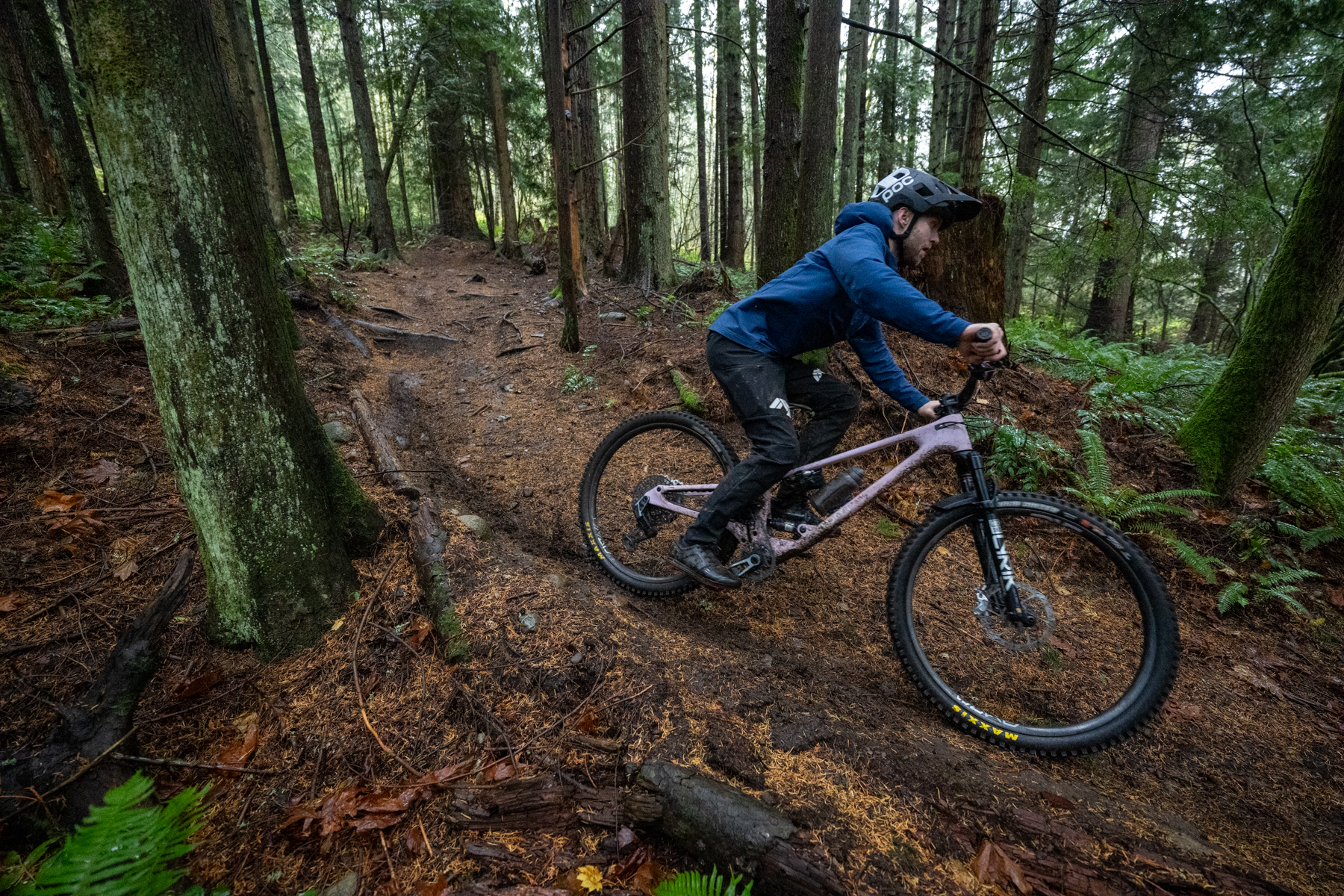
I think the notably centered body positioning that the Druid favors (particularly for its travel bracket) plays a big role in its descending performance. The Druid’s suspension performance is impressive, but there’s still a point where it can’t hide the fact that it only has 130 mm of travel to work with. When it comes to descending rough trails at speed, though, the centered body position that the Druid favors lets you keep your chest up and soak up bigger impacts through your legs, without demanding that you keep doing pushups on the bars to hold yourself up (in contrast to bikes that need more weight over the front end).
Particularly when you’re really hauling on a trail with lots of big holes / compressions, the Druid is more physically demanding than well-sorted, longer-travel bikes tend to be; the Druid takes more active management to absorb those impacts than it does on many bikes with more travel on tap. But if you’ve got the strength to do that and hang on, the Druid can tackle those sorts of trails at a much higher pace than just about anything else that doesn’t have a bunch more suspension travel.
I wouldn’t say that the Druid feels like it has more suspension travel than it does, exactly, but it makes very good use of the 130 mm that it has on tap. The Druid offers pretty good initial sensitivity and grip but is most impressive in how it deals with sharper, square-edged impacts. It’s not a bike that’s going to completely erase them, especially at speed, but everything I’ve been on that does that substantially better also has a lot more suspension travel. The Druid takes care of the sharpest part of the initial impact enough for you to be able to manage the rest through body movement / soaking it up yourself.
At this point, you might be wondering what the point of the Druid is — if it’s a short-travel Trail bike that’s most engaging when descending at least somewhat burly trails quickly, why not just get a bigger, longer-travel bike and run stuff over even faster?
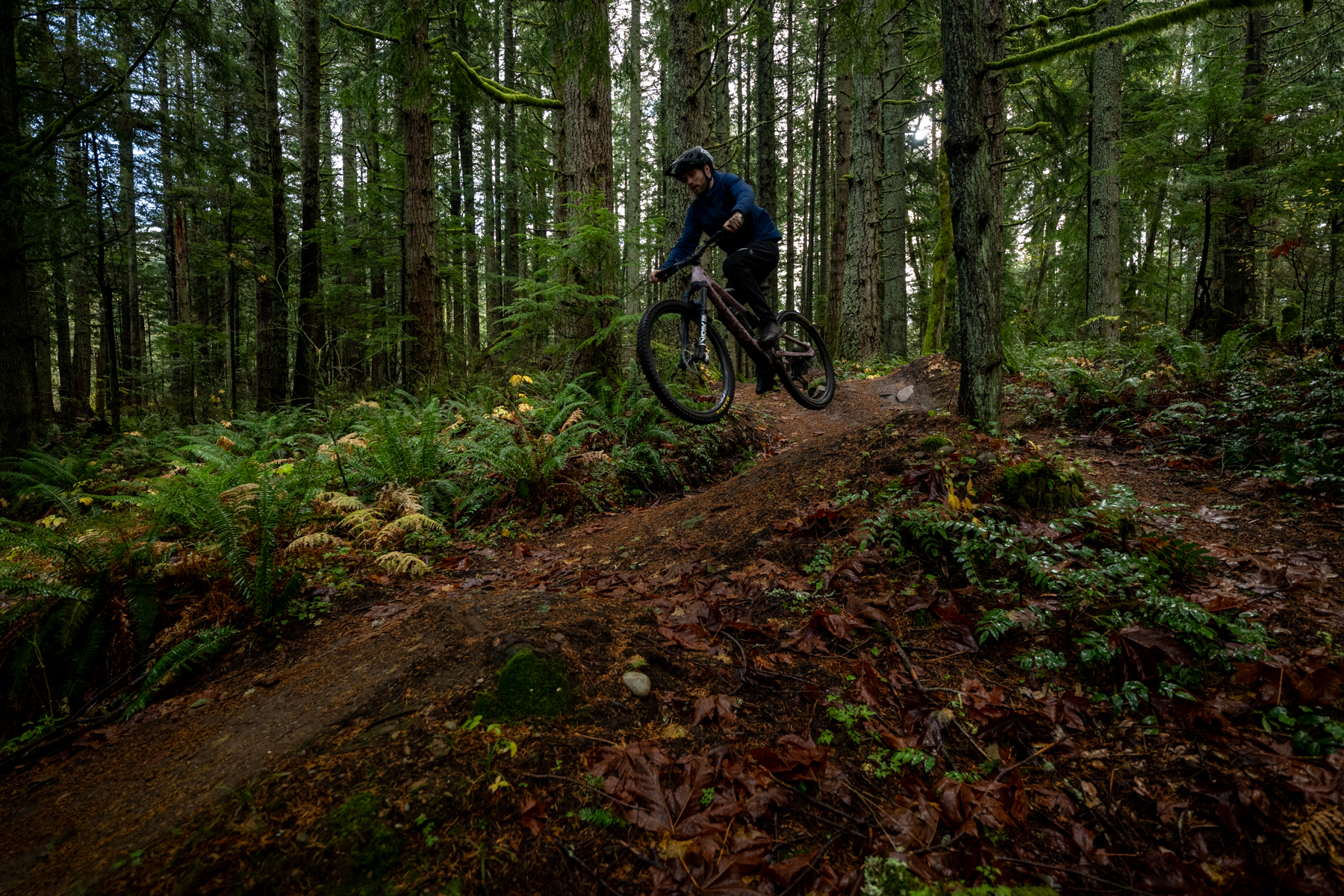
The thing is that, while the Druid feels decidedly oriented toward aggressive descending as 130mm-travel bikes go, it’s still way sharper handling and more lively than just about any 160+ mm travel Enduro bike you care to think of. And that’s a really fun middle ground. The Druid wants some speed and pitch to come into its own, but it doesn’t need nearly as much pace as big Enduro sleds tend to, and the Druid delivers a distinctly different ride once you get there.
For one thing, the Druid is still quite nimble and easy (and rewarding) to ride precisely, both in terms of line choice / handling and in how eager it is to pump through and boost off terrain features. The Druid requires a more active, dynamic approach than most substantially longer-travel bikes when descending something truly burly at speed. But those same traits also make it impressively fun and engaging on trails where you can give it some room to run, but where a full-on Enduro bike would feel like total overkill.
All of that is to say that, travel numbers notwithstanding, I think the Druid makes the most sense as a relatively lively alternative to certain ~150mm-travel bikes, rather than being all that direct a competitor to most bikes with similar rear travel.
[Check out our Deep Dive on the Druid for a lot more on those comparisons.]
Again, that’s not to say that the Druid feels like a substantially longer-travel bike than it is, exactly. The more accurate framing is that the Druid feels most at home in the kind of terrain where a longer-travel Trail (or All Mountain, if you prefer) bike would be most folks’ Goldilocks choice. The Druid gets there with a distinctly different feel than just about anything else I can think of, but it’s one that I’ve enjoyed a ton, and I think will really click for the right folks.
The Build
I tested the top-tier Druid X0 RS U build, and it’s (unsurprisingly) quite nice. I still get along very well with the RockShox Lyrik Ultimate / Super Deluxe Ultimate suspension package, the SRAM X0 Transmission groupset worked without fault, and all the finishing parts are generally well thought out, too.
I quickly swapped in a 200 mm front brake rotor in place of the stock 180 mm one for a little extra power, but the SRAM Code Stealth Ultimate brakes were enough for me once I did so. The stock Fizik Alpaca saddle happens to not work for me (which is, of course, entirely personal), so I swapped that out as well.
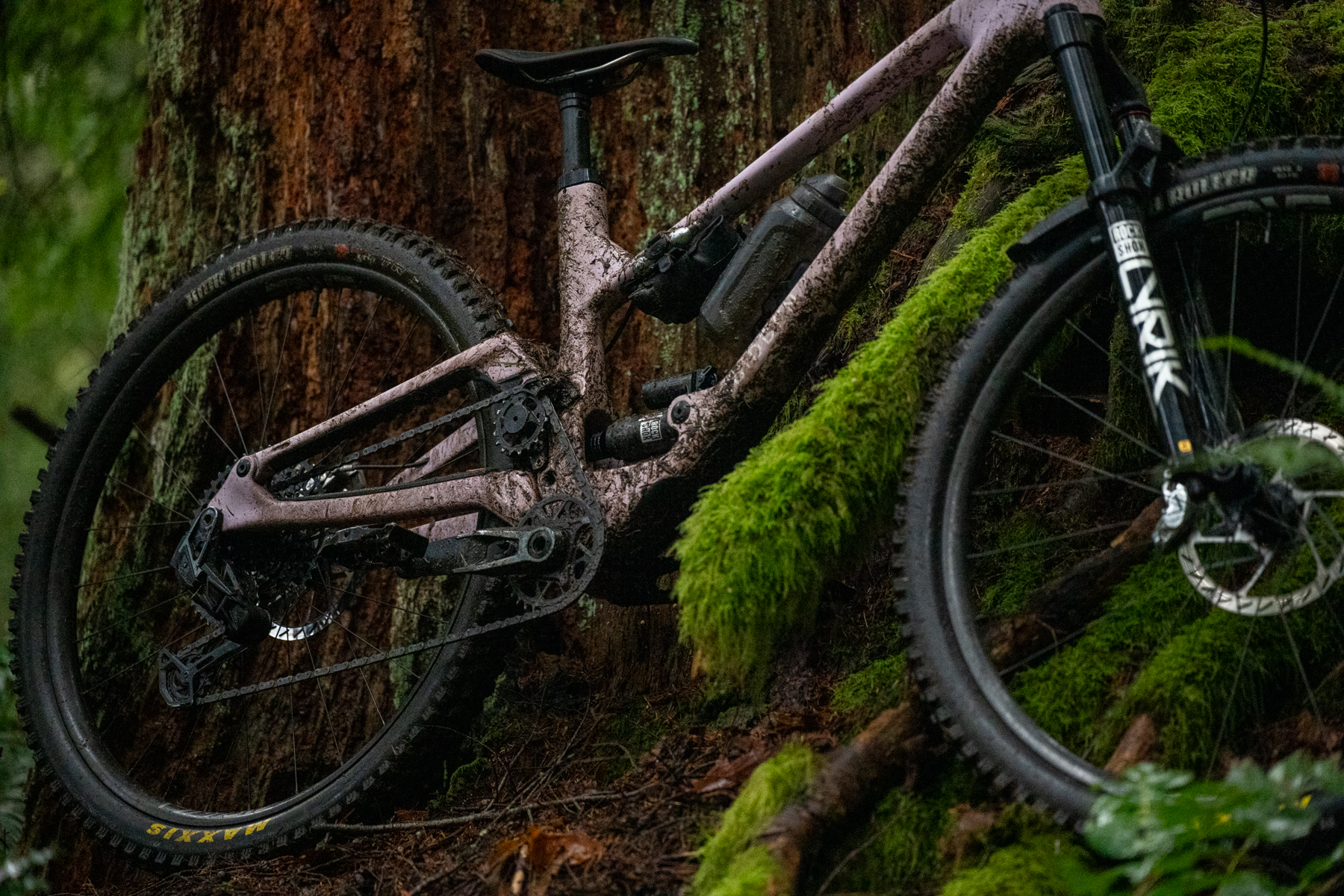
The Maxxis Assegai Exo front / Forekaster Exo+ rear tire combo (MaxxTerra rubber at both ends) is an unconventional one, but it’s a reasonably coherent pairing of a relatively aggressive front tire with a much faster-rolling rear one to balance grip and rolling resistance. I was happy running the stock tires so long as conditions weren’t super wet. I swapped in a few different options for testing purposes, and I went for a more aggressive rubber compound later to have a stickier, softer-condition-oriented combo once fall kicked off in earnest and we started getting more regular rain.
I’m not going so far as to say that Forbidden should be spec’ing much burlier tires on the Druid, but the fact that it did not feel ridiculous to put dual DH-casing Maxxis High Rollers on what is still a 130mm-travel bike says quite a bit about the Druid’s descending performance.
I’d also love a longer-travel dropper post than the 180 mm one that the S3 Druid comes with. Given the limited seatpost insertion that the Druid’s shock tunnel imposes, though, I get why Forbidden errs on the conservative side there. I was able to squeeze in a 210 mm OneUp V2 post, lowered to 200 mm stroke at my ~785 mm seat height, but it’s tight. That swap got me all the drop I wanted, but it probably won’t be an option for everyone on an S3 frame.
(For what it’s worth, the limitation is how far I can insert the post into the frame, rather than the seat tube length — I’ve got a ton of exposed post but the insertion into the frame isn’t great.)
The stock seatpost collar also developed a small crack partway through my testing. I noticed that something was amiss because I was having trouble keeping the seatpost tight; it turned out that the crack was slowly propagating and causing the clamping force to lessen as it did so. Forbidden was quick to send a replacement, which has been solid. It seems like a flukey mishap (with an easy fix), but it’s worth checking if you’re having trouble keeping your seatpost tight. I know a few people with V2 Druids and Dreadnoughts who have not had the same issue, so I don’t think it’s widespread.
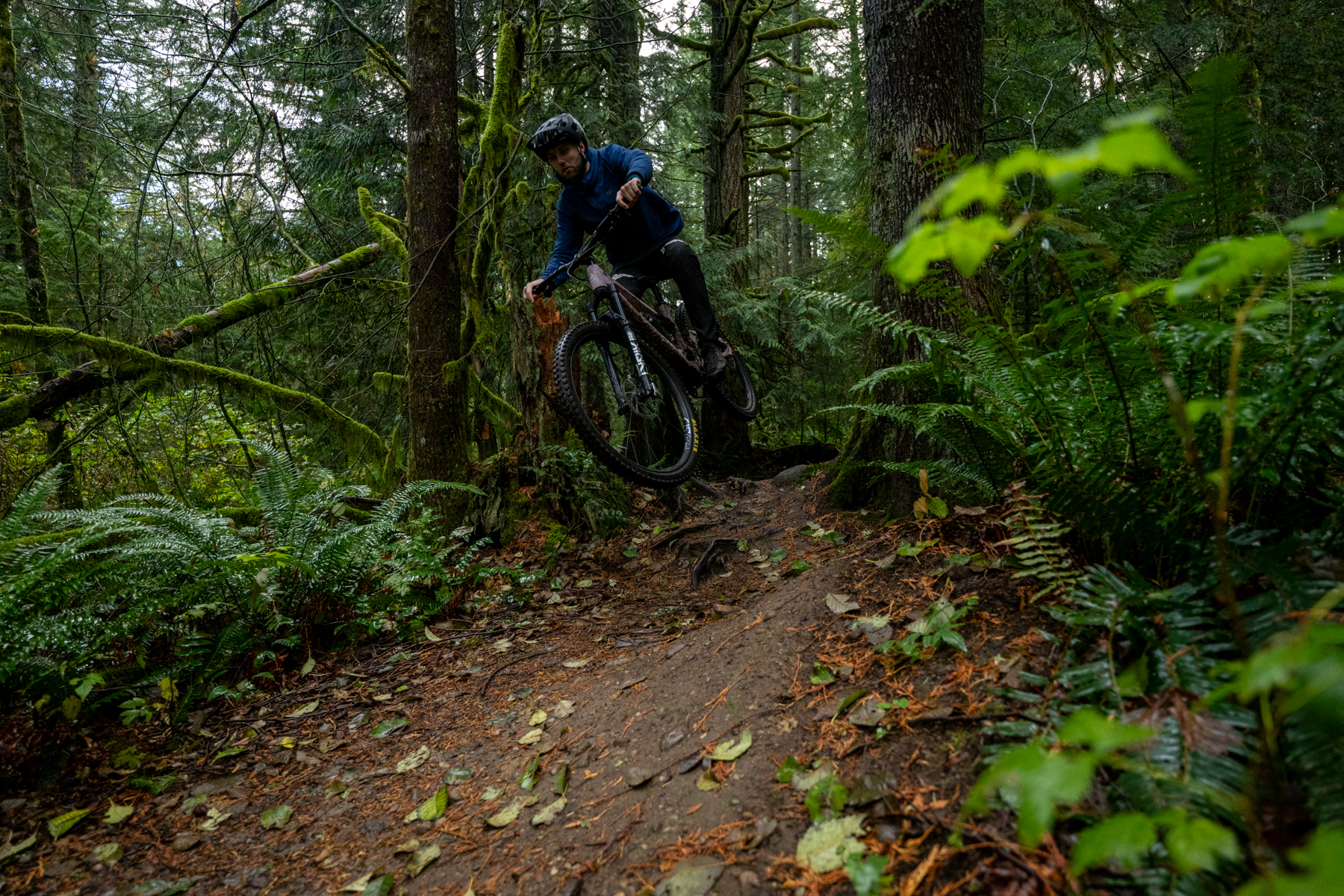
Who’s It For?
The Druid brings a rather uncommon combination of traits to the table, but it’s a combo that I think will really click for some folks. Do you spend a lot of time on big Enduro or DH bikes and want a Trail bike that’s quicker handling and more lively than them? Do you also want this new bike to preserve a lot of the more centered body positioning that modern gravity bikes tend to favor? If so, the Druid does that better than anything else I’ve been on to date.
The Druid also has a lot of promise as an in-betweener sort of bike for riders who want a relatively descending-oriented Trail bike but don’t quite have the terrain to justify a true Enduro setup, or who just find modern Enduro bikes to be too planted, stable, and dead-feeling unless you’re going flat out on them.
Bottom Line
High-pivot bikes have some real upsides, but working them into a coherent shorter-travel package can be tricky. Forbidden has done it, though. The Druid V2 brings a unique combination of traits to the table. It’s a notably descending-oriented 130mm-travel bike that’s still much more lively and energetic-feeling than most big Enduro bikes, and that’ll be a compelling combination for the right folks.
Deep Dive Comparisons
BLISTER+ members and those who purchase our Digital Access Pass can check out our Deep Dive comparisons linked below. Get our Digital Access Pass to view all our Deep Dives and Flash Reviews, or become a BLISTER+ member today to get access to that and a LOT more, including the best worldwide Outdoor Injury Insurance, exclusive deals and discounts on skis, personalized gear recommendations from us, and much more.
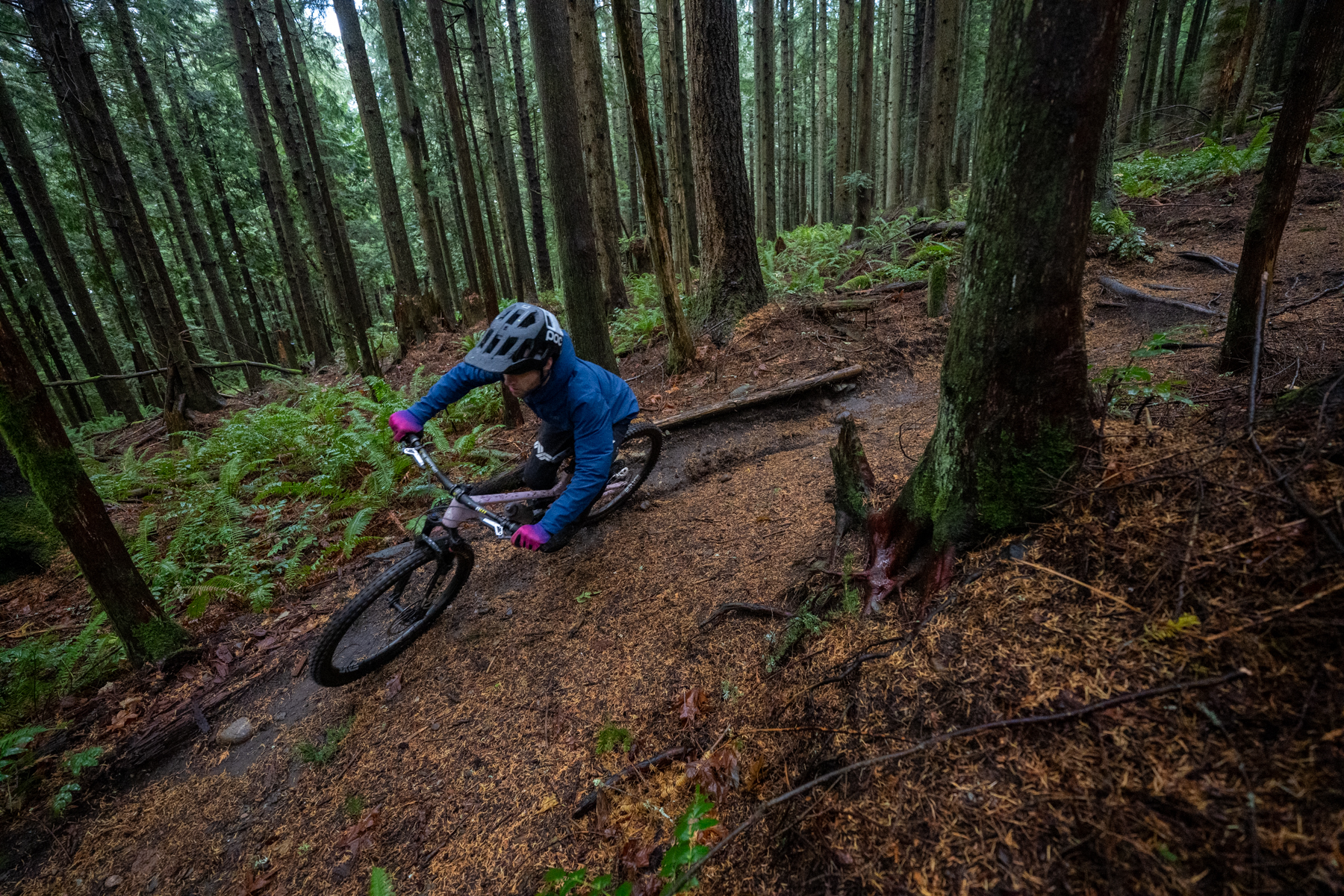
Deep Dive: Forbidden Druid V2
We compare the Forbidden Druid V2 to the Transition Smuggler, Chromag Darco, Norco Optic, Norco Sight, Deviate Highlander II, and Orbea Rallon.
Blister’s Flash Reviews and Deep Dives are accessible to those who purchase one of our paid subscriptions
To get our comprehensive Deep Dives and our initial, unfiltered reports on new gear, become a member and receive many other services, deals, and discounts.
If you’re already an active member, please log in.
(If you’re already logged in and a member in good standing and seeing this message in error, please refresh this page in your browser.)

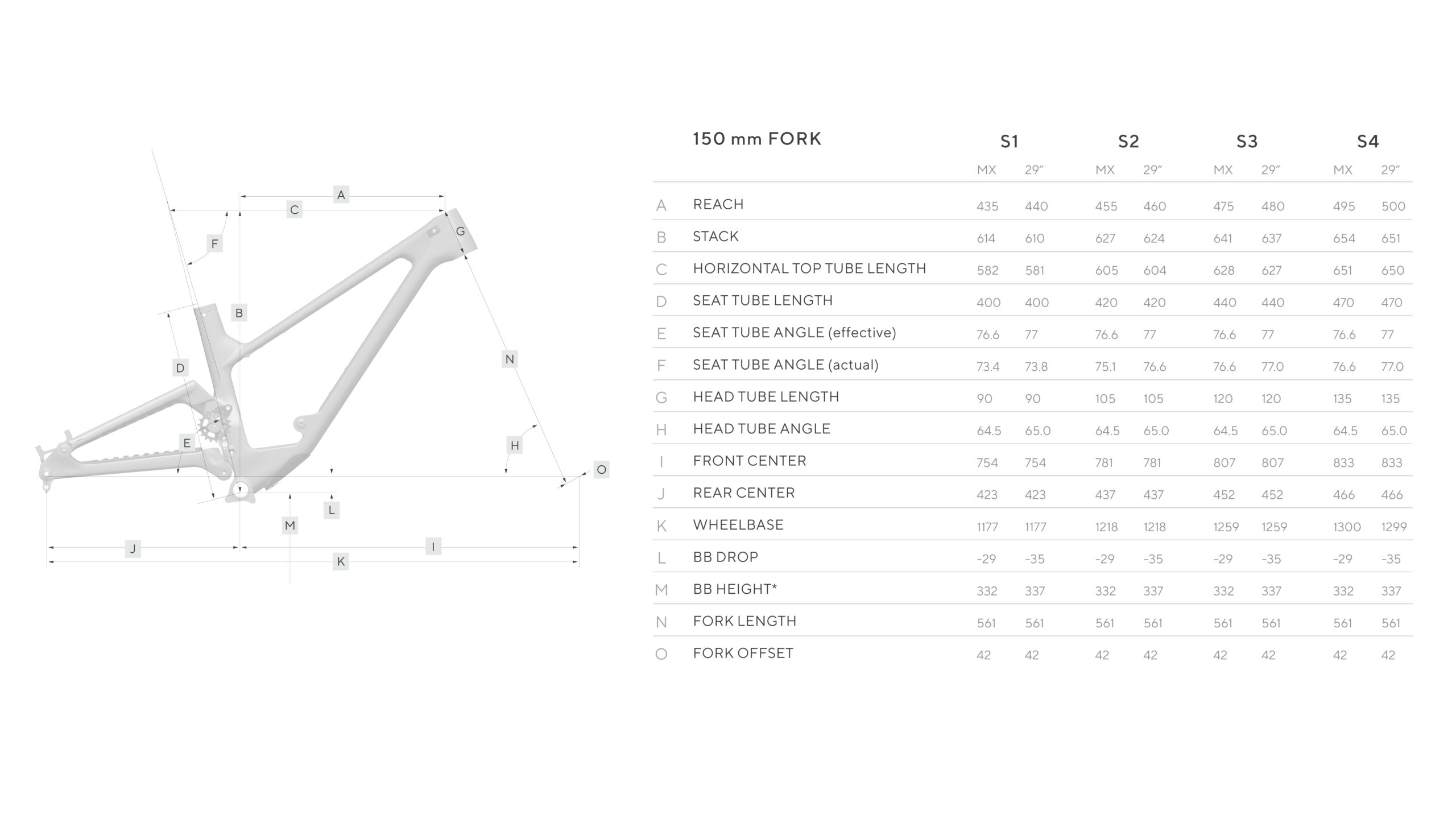
Would love to see more exciting frame colors ASAP, like that Dreadnought candy blue would be sick on the Druid. The sage is okay but too Oso/Yeti for me
Agreed, more old school bass boat style paint jobs.
Sizing is a bit tricky for me on this updated Druid. Looking to make a frame only purchase (29er), but unsure if I want an S3 or S4. At 190.5cm tall I fall at the tail end of the S3 and beginning of the S4. I prefer my trail bikes to be somewhat snappy, and the wheelbase (and subsequent rear center growth) has me unsure of it’s ability to handle tight and twisty single-track. If I were to get the S3 I would likely put a 50mm stem to add a bit more reach. Should I be looking at S3 or S4?
S4 would be better balanced front/rear vs going S3 with a longer stem.
Is it time for the full review?
Heloooo blister peeps?
We’d hoped to have the new Druid in to review by now, but they’re proving to be tough to come by. Still hoping to get on one at some point.
Bump… the people want to know!
We’re not holding out on you. Forbidden took way, way longer to get us a review bike than initially promised, but it’s finally en route. Flash review coming soon and a full review to follow.
How’s the full review coming along?
We’re getting close!
I know I’m a non-sub peasant and will likely be dismissed, but I’m dying for a Druid V2 / Banshee Prime V3.2 comp.
Cheers and thanks for the review.
I haven’t been on the Prime, so can’t speak to that one I’m afraid.
I snagged a Druid S4 when they went on sale. It’s a one-bike quiver for me. I prefer the comfort of the balanced riding position, even on the rolling terrain. Chainstays and seat tube angles in XL sizes are still too short and slack on most trail bikes, and tall folks shouldn’t have to ride a sled just to get that balance. Additionally, I think the reason people have a hard time classifying and interpreting the performance of this bike is that they are reluctant to acknowledge that a well-thought-out compromise is more enjoyable than the minutia of their favorite niche. For me, this bike is the GOAT of versatility. It’s all the zip you need and all the capability you need with the balance that every mountain biker deserves.
Have you run the OEM Forekaster? Is it a viable rear for a bike like this? I’m thinking of running the Assegai/Forekaster combo on a Banshee Prime for more efficiency, but as David notes, it’s an unconventional choice for this class of bike…
Yep. Trails tend to be pretty dry and firm where I ride, making for a nice climb and acceleration. Cornering is also great. If I road rocky, loamy, or more primitive steeper trails I’d want more meat on my rim, but on the occasions I do end up on that kind of surface I embrace the drift in the back end. Tires are probably the most trail-type-dependent component on a bike. I agree with David; it is unconventional, but it works great in the scheme of the compromise they’re trying to strike.
Any thoughts on how much of the descending performance is coming from the geometry vs. the high pivot suspension layout? I’m curious how the Druid compares to the Raaw Jibb and Banshee Prime which have similar geo, but no HP.
I’m looking for max seatpost drop and insertion. How much exposed post do you have on your 210 OneUp fully lowered but not kinking the cable? Thanks
Did you ever get a response to this?
I’ve got a V2, S3, and I’m looking at the 210 as well, but I am trying to have as little post above the collar as possible, not sure it will be a big improvement over the 175mm v1 Reverb AXS I have currently.
David,
At any point did you want a firmer compression tune in the shock? Forbidden specs the softest C26 tune and I tend to like more HSC.